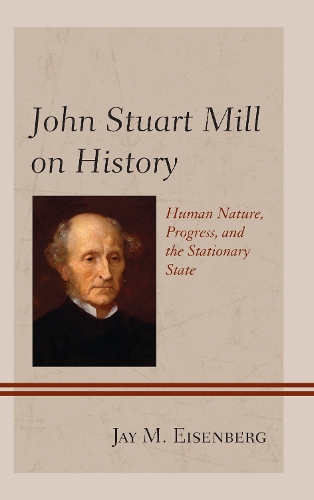
John Stuart Mill on History: Human Nature, Progress, and the Stationary State
(Hardback)
Publishing Details
John Stuart Mill on History: Human Nature, Progress, and the Stationary State
By (Author) Jay M. Eisenberg
Bloomsbury Publishing PLC
Lexington Books
15th October 2018
United States
Classifications
Professional and Scholarly
Non Fiction
Social and political philosophy
Philosophy
192
Physical Properties
Hardback
246
Width 152mm, Height 229mm
Description
Though Mill has been the subject of an imposing volume of scholarship, his philosophy of history has received scant attention. This inquiry considers the role of history in Mills break from the Benthamite radicals, his effort to define a methodology for the study of society modelled on the natural sciences, and his speculations about the course and meaning of history. A dominant theme is Mills struggle to reconcile his ambition to develop a comprehensive science of society with his convictions that human nature is malleable and that history progresses as a consequence of intellectual achievement and diversity of beliefs. Mills compatibilist vision of the individual as driven by deterministic psychological laws and as also capable of freely choosing a life of autonomous self-culture was mirrored in his philosophy of history, as Mill retained the materialistic stadial theory of social development proposed during the Scottish Enlightenment, and an idealistic vision of history derived from the Saint-Simonians, Guizot and Comte. Though Mill claimed the primacy of the intellect in advancing material living conditions, he believed that the culmination of instrumental rationalism in his own Age of Commerce was undermining and marginalizing other forms of individual accomplishmentindeed, individuality itselfin the suffocating conformity of mass culture. Mindful of what he considered to be the culturally stationary states of Asia, Mill dreaded the prospect that a commercial culture with no higher ambition than the acquisition of ever-greater wealth would also become inert as the consequence of overbearing social conventions and intellectual stagnation. Like Smith and Ricardo, Mill anticipated the inevitability of the economically stationary state as the consequence of the fall in the rate of profits under free market capitalism, but rather than await its arrival, Mill seized on its possibilities. The stationary state became Mills vehicle for advocating an egalitarian supra-subsistence economy in the expectation that cultural priorities would shift to the pursuit of higher moral, intellectual and aesthetic aspirations, and the revitalization of individual autonomy.
Reviews
To understand John Stuart Mill, philosophers must yield to historians of ideasfor Mill is one of their own. Grounded in current Mill studies and a close reading of the entire range of Mills work, Jay Eisenberg identifies Mills historical method in the moral sciences and his speculations on the future of progressive civilization as both cause and consequence of his break from Benthamism. The epilogue is a thoughtful reflection on the ways Mill is relevant for our own times. -- Eldon J. Eisenach, University of Tulsa
In his crisply written book, Jay Eisenberg artfully underscores the role of historical understanding in John Stuart Mills political theory. Scholarship in recent decades has clarified how Mills ideas about freedom, democracy, and individuality must be grasped in the context of Mills moral philosophy. Eisenberg shifts the focus to Mills philosophy of history. In so doing he sheds new light on the relevance of Mills analysis of threats to human progress in the age of mass society and speculations about stationary state political economy to current worries over human progress. -- Bruce Baum, University of British Columbia
Jay Eisenberg's new study on John Stuart Mill weaves together themes from Millsuch as history, human nature, the normativity of utility, freedom, and self-developmentthat many readers of Mill find inconsistently and unsystematically combined. Anyone interested in nineteenth-century classical utilitarianism in general, as well as in Mill's version of it in particular, should read this very clearly written book. -- David Weinstein, Wake Forest University
Author Bio
Jay M. Eisenberg is an independent scholar in the history of ideas, with masters and doctorate degrees from Brandeis University and Drew University.
